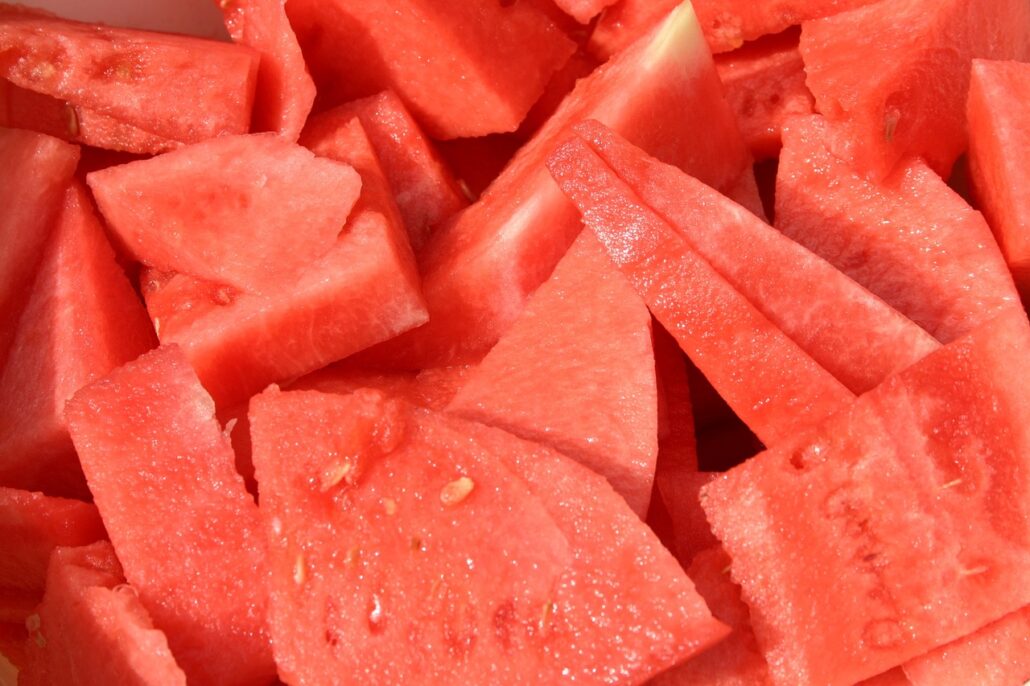Does Watermelon Have Lectins?
You may be wondering if watermelons are high or low in lectins.
While there are a lot of unknowns on lectins, there has been some research on lectins in watermelons.
Research shows that watermelons do contain some amount of lectins, although the amount was not quantitatively measured in numbers.
Generally speaking, from what we have seen, fruits that have lectins have far lower lectin quantities than many of the high lectin foods like beans or other legumes.

Are Watermelons Low In Lectins?
While research showed that watermelons do contain some amount of lectins, the amount was not specifically measured in numbers. From looking at different research, it certainly seems that foods like legumes have far higher lectin quantities than fruits.
That being said, those foods are also cooked, which reduces the lectin quantity. Even so, it seems that those amounts would still generally be more than in fruits.
Remember that some foods like beans, grains, and rice need to be cooked, whereas fruits can generally speaking be eaten totally raw.
Are Watermelons High In Lectins?
Research showed that watermelons do contain lectins, but it’s hard to say whether watermelons are high in lectins since no specific number was mentioned quantitatively.
That being said, it seems that high lectin foods like beans generally contain much more lectins than fruits. This is also indicated by the fact that foods like beans have to be cooked to be eaten safely. Cooking reduces the number of lectins. Fruits on the other hand can generally be eaten safely raw.
Do Watermelons Contain Lectins?
Yes, several pieces of research seemed to show that watermelons do contain lectins. Both showed lectin activity when testing the fruit of the food. One piece of research also looked at the seeds which did not show lectin activity.
The amount of lectins may not be that much compared to those in grains, legumes, and etc. as seems typical for fruits.
Watermelon Nutrition
Watermelons contain a variety of different nutrients, including vitamins, minerals, and antioxidants.
They are fruits and so they are generally regarded as healthy. They don’t contain as much fiber compared to sugar as other foods, for example, blueberries, and therefore provide more short term energy compared to long term energy.
They are made up of a large amount of water, over roughly 90%, hence the name watermelon and are very sweet.
Macronutrients
One serving of watermelon (286g) contains mostly carbohydrates, a bit of protein and a very small amount of fat.
One wedge (286g) contains around 21.6g carbohydrates, 1.74g of protein, and .43g of fat.
It also contains a variety of amino acids such as small amounts of Tryptophan (0.02g), Threonine (0.077g), Leucine (0.051g), Tyrosine (0.034g) and Arginine (0.169g).
Micronutrients
As mentioned, watermelon contains a variety of vitamins and minerals as well, such as a fairly substantial amount of Vitamin C (around 37% per serving) and Vitamin B6.
It also contains many trace minerals including around 20mg of Calcium, 28.6mg of Magnesium, and 320mg of Potassium.
Watermelon Seeds
Watermelon seeds come in multiple varieties, including black and white seeds. The white seeds are generally okay to eat, however the black seeds are generally spit out or avoided. The black seeds are generally hard while the white seeds are softer and are believed to be easier on the stomach.
Sometimes the seeds will be removed from a slice before it is eaten, as opposed to spitting them out, but some will still be in the fruit and not on the exterior of each slice or visible.
Some watermelons are seedless, although they may still contain some seeds.
Watermelon seeds do not contain lectins, according to one piece of research, although it does not indicate what type of seeds they were.
Dishes That Contain Watermelon
Watermelon is generally a food that is eaten by itself, however one of the most common places you may find it in a dish or on a restaurant’s menu is in a salad.
Slices of watermelon are frequently eaten at BBQ’s and picnics, so you will often see them alongside BBQ ribs or other meats grilled at BBQ’s such as cheeseburgers, hamburgers, and chicken.
Resources
- https://sciendo.com/article/10.1515/sjecr-2016-0031
- http://medicinalplants-kr.org/
- https://fdc.nal.usda.gov/fdc-app.html#/food-details/167765/nutrients
